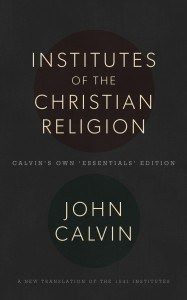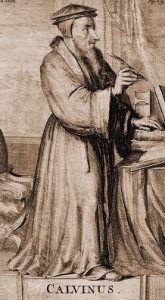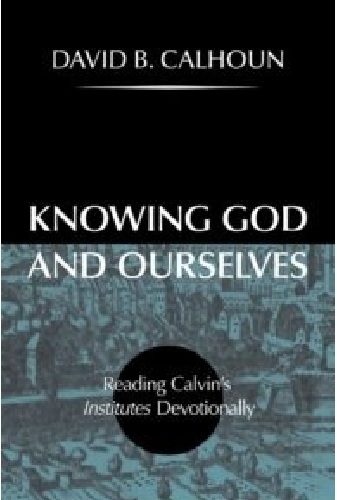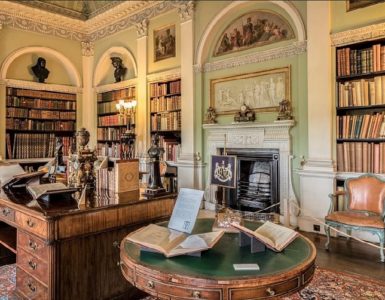As has been noted often on Presbyterians of the Past, this year is the five-hundredth anniversary of Martin Luther posting his theses regarding some of the practices of Roman Catholicism, but those of us with Presbyterian and Reformed interests seem to have turned it into another Calvin 500th birthday remembrance. The Lutheran and Reformed confessional lines coming from the Reformation both flowed from sola Scriptura but developed somewhat differently with respect to their doctrines and practices, so despite Luther’s theses, Calvin is once again the subject of a post. One especially helpful recent book is David B. Calhoun’s Knowing God and Ourselves: Reading Calvin’s Institutes Devotionally which was published by Banner of Truth last year. Readers may associate Dr. Calhoun primarily with American Presbyterian history due to his two-volume history of Princeton Seminary; his histories of First Church, Columbia, First Church Augusta, and Independent Presbyterian Church in Savannah; and Our Southern Zion: Old Columbia Seminary (1828-1927), but during his years teaching in Covenant Seminary, St. Louis, he also taught a course on Calvin’s Institutes.
Dr. Calhoun’s stated purpose is “to help students, especially beginning students, of Calvin’s Institutes to better understand what you are reading and to encourage you to persist in working through this important but challenging book” (ix). Those who have attempted to dig into Institutes and failed to finish it are likely to have been reading the two-volume edition edited by John T. McNeill and Ford Lewis Battles, 1960, which includes in its intimidating 1789 pages an abundance of notes and material suited for academics but difficult for novices. Following his introduction, Dr. Calhoun’s book progresses through the four books of Institutes with each of his twenty-six chapters following a simple pattern. Each chapter begins with a quote from a work by Calvin incorporating the title Dr. Calhoun selected for the chapter, then a quote or comment from a writer about Calvin is set off in a block, which is then followed by the references for the portion of Institutes to be read for the chapter, then there is a Bible text, followed by a “Notable Quote” from Calvin, a prayer, and finally the text explaining and summarizing Calvin’s teaching from Institutes. Sprinkled throughout the book are additional block quotes which shed more light on Calvin’s teaching. The book’s 341 pages are bound with quality cloth and covered with a simple but attractive dust jacket.
 One important feature of the book is that the portion of Institutes to be read for a chapter is not only given in the usual book, chapter, and section as coordinated with the McNeill-Battles edition (i.e. II.16.13), but the reading assignment is also referenced via page numbers to Banner of Truth’s Institutes of the Christian Religion, 2014, which is Robert Whites translation of Calvin’s French edition of 1541. White’s edition includes a limited number of footnotes for necessary points of clarification and comment, but it is not a short edition of Institutes because the text is over 800 pages in length. One of the benefits of White’s edition is that it reads very well; the disadvantage is that Calvin published the French from which it was translated eighteen years before the 1559 Latin edition which is considered Calvin’s definitive Institutes. However, despite eighteen years of advance in his thought, Calvin’s views generally changed very slowly and his fundamental points were fairly consistent over the years. Those who would like to get into Institutes would find Calhoun’s book and White’s translation a good pair. Maybe Banner could offer these two books together as an introductory package on Calvin’s Institutes.
One important feature of the book is that the portion of Institutes to be read for a chapter is not only given in the usual book, chapter, and section as coordinated with the McNeill-Battles edition (i.e. II.16.13), but the reading assignment is also referenced via page numbers to Banner of Truth’s Institutes of the Christian Religion, 2014, which is Robert Whites translation of Calvin’s French edition of 1541. White’s edition includes a limited number of footnotes for necessary points of clarification and comment, but it is not a short edition of Institutes because the text is over 800 pages in length. One of the benefits of White’s edition is that it reads very well; the disadvantage is that Calvin published the French from which it was translated eighteen years before the 1559 Latin edition which is considered Calvin’s definitive Institutes. However, despite eighteen years of advance in his thought, Calvin’s views generally changed very slowly and his fundamental points were fairly consistent over the years. Those who would like to get into Institutes would find Calhoun’s book and White’s translation a good pair. Maybe Banner could offer these two books together as an introductory package on Calvin’s Institutes.
This paragraph provides a few observations and comments gleaned from Knowing God and Ourselves. Dr. Calhoun comments that in the sixteenth century books of theology were titled summa, which is exemplified in Thomas Aquinas’s Summa Theologica, but Calvin’s selection of institutio reflected his background in law which often used institutio to describe summaries of law (3). If the book had an index it would show that one of Dr. Calhoun’s favorite Presbyterians of the past to quote was B. B. Warfield (ix, 9, 13, 15, 17, 49, et al.). This is not surprising considering the Kentuckian’s considerable number of writings on Calvin and Dr. Calhoun’s extensive study of Princeton Seminary. In the place of footnotes for documentation, the sources are referenced either within the text itself or with parenthetical references, which contributes to the flow of the text and eliminates the need for eyes to fall to the bottom of the page for sources. Dr. Calhoun also occasionally included information in brackets within the text such as his description of Pighius as a “Dutch theologian who wrote against Calvin’s views” (232). The organization of each chapter is often broken into points and subpoints coordinating with Calvin’s presentation which contribute to an organized and easy to follow explanation of the content of Institutes.
 Generally speaking, the numerous books and articles published annually about John Calvin are written by academics for other academics, teachers, and ministers, but Dr. Calhoun’s book takes a significant step in the direction of bringing Institutes to those with limited theological background. Knowing God and Ourselves is not a simple book because it is unlikely a simple book could adequately express Calvin’s teaching without becoming simplistic. However, the subtitle, Reading Calvin’s Institutes Devotionally, shows that a distillation of the essence of Calvin’s ideas in Institutes has been accomplished for contemplation and meditation. If you really want to understand more about Calvin’s Institutes, then Knowing God and Ourselves teamed with Robert White’s translation of the 1541 edition would be a good investment of money and time. The twenty-six chapters of Dr. Calhoun’s book works out to having a group study every-other week for about a year, so studies could be organized in churches titled, “Through John Calvin’s Institutes of the Christian Religion in a Year.” Both titles are available in hard copy and e-reader forms on the Banner of Truth website.
Generally speaking, the numerous books and articles published annually about John Calvin are written by academics for other academics, teachers, and ministers, but Dr. Calhoun’s book takes a significant step in the direction of bringing Institutes to those with limited theological background. Knowing God and Ourselves is not a simple book because it is unlikely a simple book could adequately express Calvin’s teaching without becoming simplistic. However, the subtitle, Reading Calvin’s Institutes Devotionally, shows that a distillation of the essence of Calvin’s ideas in Institutes has been accomplished for contemplation and meditation. If you really want to understand more about Calvin’s Institutes, then Knowing God and Ourselves teamed with Robert White’s translation of the 1541 edition would be a good investment of money and time. The twenty-six chapters of Dr. Calhoun’s book works out to having a group study every-other week for about a year, so studies could be organized in churches titled, “Through John Calvin’s Institutes of the Christian Religion in a Year.” Both titles are available in hard copy and e-reader forms on the Banner of Truth website.
Knowing God and Ourselves ends with a quote about Calvin’s Institutes and a prayer of thanksgiving from his works. The quote is from Jean Cadier’s fine but neglected little biography of Calvin titled, The Man God Mastered.
I am thinking of the man who said to me a short time ago as he came out of a lecture, “I have just been converted through reading the Institutes.” And when I asked him to tell me what exactly had been the message which had effected this transformation in his life, he replied: “I have learnt from reading Calvin that all the worries about health and about the uncertain future which had hitherto dominated my life were without much importance and that the only things that counted were obedience to the will of God and a care for his glory.”
If John Calvin had been standing there with Cadier as the man recounted his experience with Institutes, he might have nodded his head affirmatively and said, “You got it, you understand the message of my Institutes.”
Barry Waugh
The book by Jean Cadier is The Man God Mastered, which was translated from the French edition of 1958 by O. R. Johnston and published by Eerdman’s in its first English edition in 1960.





